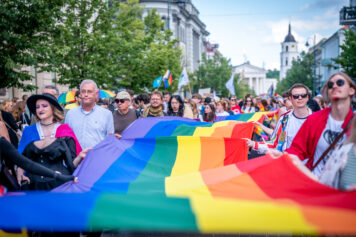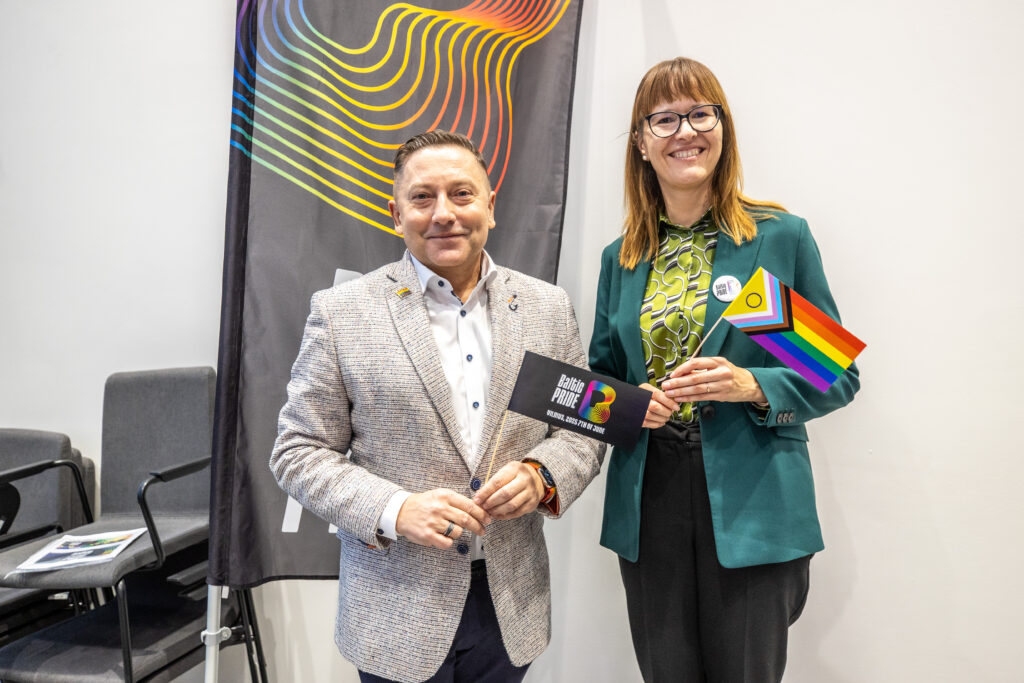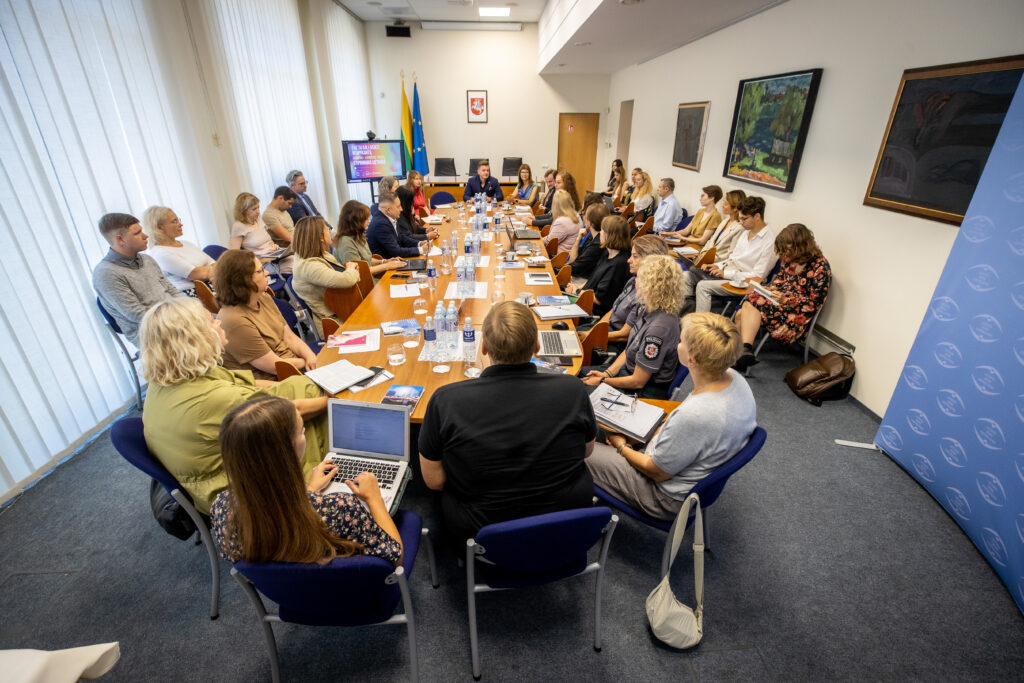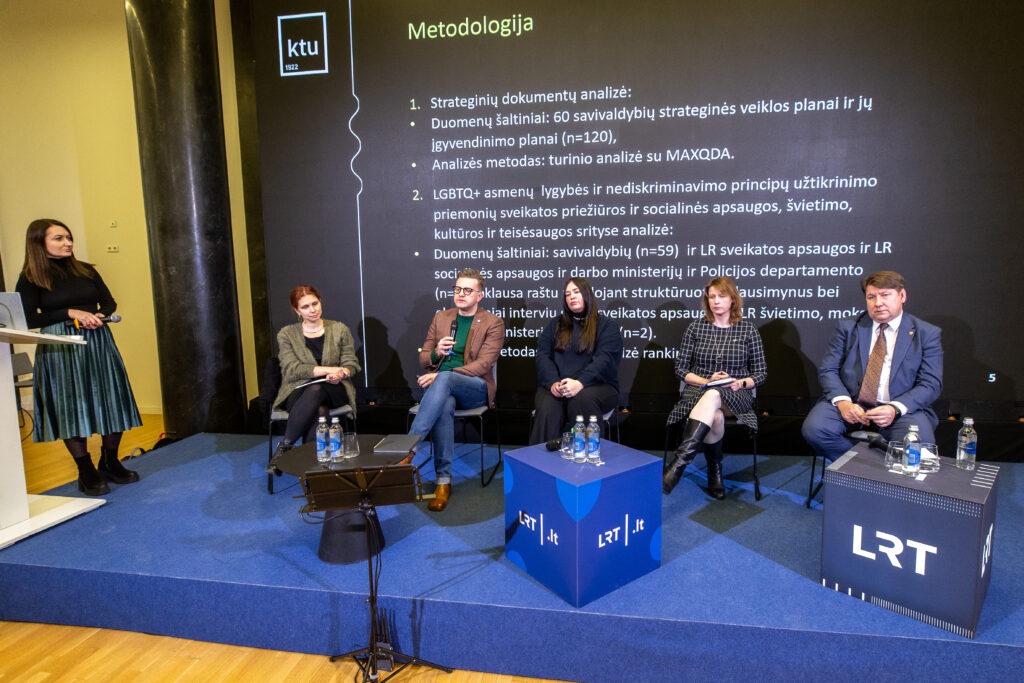2024 marked important changes in the development of LGBTI+ rights in Lithuania: the LGBTI+ rights festival “LT Pride” attracted over 15,000 participants, the Constitutional Court of the Republic of Lithuania recognized that the provision in force since 2009 prohibiting the dissemination of information about same-sex families to minors is anticonstitutional, and an unprecedented project assessing LGBTI+ inclusion in Lithuanian municipalities was implemented for the first time. The European Commission against Racism and Intolerance (ECRI) also called on the Lithuanian government to create a national LGBTI+ rights plan.
“The LGBTI+ community is part of society and only when institutions act together and in a coordinated manner can we expect real changes to ensure the fundamental rights and equal opportunities of all members of society. I am pleased with the continuing constructive relationship with Vilnius City Municipality and I hope that best practices will be gradually implemented in other Lithuanian municipalities,” said Vladimir Simonko, head of the Lithuanian Gay League.
Back in 2023, the Lithuanian Gay League prepared guidelines for the national LGBTI+ plan, which have been presented nationally and internationally. “It is very important that LGBTI+ rights issues were presented during the inter-institutional discussions organized by the Seimas Ombudspersons’ Office, which indicates greater interaction between civil society and institutions. Ensuring the needs and equal opportunities of LGBTI+ people must also find a place in Lithuania’s strategic planning instruments”, continued Vladimir Simonko.
In Lithuania, particularly problematic areas remain the absence of an institution defining legal relations of same-sex families, the lack of clear legal protection on the grounds of gender identity and expression, and the process of legal gender recognition, which still requires a medical diagnosis and court approval.
The decision of the Constitutional Court of 18 December 2024 became a historic event in the development of LGBTI+ rights. By recognizing the so-called “gay propaganda” ban as contrary to the Constitution, the Court formed national practice in line with European standards. The decision emphasized that information about various family models and interpersonal relationships cannot be automatically considered inappropriate, and that the current regulation hinders the development of minors into mature, well-rounded people.
“This victory for human rights and democratic values is long overdue. Since 2009, when the provision on the restriction of LGBTI+ information became part of the Lithuanian legal system, the legislator has had many opportunities to do away with it, even without waiting for Lithuania’s defeat in Strasbourg. The provision on the “gay propaganda ban” is no longer in force in Lithuania from the moment the Constitutional Court made its decision, but decision-makers must also assess the importance of not only formally implementing the Strasbourg decision, but also helping the public to become aware of this legal and social reality and creating conditions for eliminating the consequences of systemic inequality of LGBTI+ persons. I hope that the Constitutional Court’s decision will become an incentive to give more attention to quality education on LGBTI+ rights topics for the public and specialists of various fields,” said Monika Antanaitytė, a lawyer and representative of the Lithuanian Gay League.
Law enforcement institutions urged to respond more actively to incidents of hate
The investigation by the Seimas Ombudspersons‘ Office of the Republic of Lithuania into police actions during the disrupted civil society protest for inclusive education in 2023 has revealed systemic gaps in the law enforcement system. The Seimas Ombudsperson, Head of the Seimas Ombudspersons‘ Office of the Republic of Lithuania Erika Leonaitė found that the insufficient proactivity of police officers in responding to the actions of hostile agitators violated the rights of the participants in the gathering. The agitators not only exerted psychological pressure, but also used flagpoles with the national flag to intimidate peaceful protesters, but the police did not take sufficient action to protect those assembled.
According to representatives of the Lithuanian Gay League, in 2024 the organization received a number of complaints from members of the LGBTI+ community about shortcomings in the work of the police in hate crime cases. The personal experiences of victims show that hate crimes, even in the cases when violent actions, such as tear gas, are performed against the victims, are not taken seriously enough, and the nominal administrative fines imposed on offenders do not achieve their goal – the offenders tend to repeat their actions directed against LGBTI+ persons. There is also a lack of specialized psychological assistance. Among the 23 support services for victims of hate crimes operating in Lithuania, there is not a single one that specialises in providing assistance to LGBTI+ people.
Systemic challenges in the healthcare system
The healthcare system stands out as one of the most problematic areas in the context of ensuring LGBTI+ rights. Laws on healthcare for transgender people are criticized for insufficient coverage, gender confirmation surgeries are practically inaccessible, and hormone therapy is not reimbursed. These systemic shortcomings not only limit LGBTI+ people’s access to necessary healthcare services, but also create additional psychological stress in the community.
The Lithuanian Gay League, together with the Association of Sexual Medicine, organized training on the topic of LGBTI+ health, which were conducted by experienced medical doctors in their field: Donata Lukošiūtė, Giedrė Jonušienė, and Robertas Adomaitis.
“Gender incongruence or being transgender is an independent individual state and is not part of any psychopathological disorder. People experiencing gender incongruence, distress and dysphoria and seeking gender-affirming medical procedures have the right to receive such assistance, while maintaining the highest principles of confidentiality and ethics.
As many as 1 in 3 transgender people report experiencing stigma or discrimination in healthcare settings, and 1 in 4 express fear that they will not receive help due to discrimination. Delayed assistance manifests itself in the consequences of the stigma-illness model, where the exclusion of transgender people results in poor socio-economic status, mental and physical health, and this predisposes them to early illness and death. It is established that mental health improves and minority stress decreases when a transgender person receives professional help,” said psychiatrist Dr. Giedrė Jonušienė in her report.
“Sex originated as a reproductive function, but over time it has acquired a completely different, currently dominant function among people – it has become a means of communication. Sex is a particularly strong sign of affection and commitment. Most people, including LGBTQ+, seek an intimate partner, because in our consciousness such a partner is an important guarantee of security. LGBTQ+ people are constantly experiencing external pressure from society due to their unusual choice of partner, and also experience fewer opportunities to find a partner than heterosexual people. Constant minority stress worsens the physical health of LGBTQ+ people,” said sexual medicine doctor, urologist Robertas Adomaitis.
Regional dimension and the “spiral of silence” phenomenon
A detailed analysis of Lithuanian municipal policy measures conducted by a team of researchers from Kaunas University of Technology revealed differences between municipalities’ approaches to LGBTI+ rights. The fact that only one municipality mentions the LGBTI+ community in its strategic plans illustrates the systemic invisibility of LGBTI+ people at the institutional level.
During the discussion at the National Human Rights Forum, VU TSPMI Assistant Professor Dr. Ieva Petronytė-Urbonavičienė also emphasized the “spiral of silence” phenomenon – in the provincial regions, not only LGBTI+ people, but also supporters of their rights choose to remain silent, avoiding social sanctions. This dynamic is illustrated by the different reactions of municipalities to LGBTI+ events: while in 2023 not a single municipal institution in Kaunas agreed to provide space for a Pride event, in 2024, during this discussion, the mayor of Akmenė district unexpectedly promised to allow a Pride march to be held in his city.
The importance of competence development
The project “More Effective Protection of LGBTI Rights by Strengthening Inter-institutional Cooperation”, supported by the Ministry of Social Security and Labour, has become an unprecedented attempt to address the problem of the lack of competences of specialists in the field of LGBTI+ rights. The project activities reached more than 500 specialists from the education, social security, law enforcement, culture and healthcare sectors, and events for specialists were held not only in Vilnius, but also in Visaginas, Kelmė, Zarasai, Mažeikiai, and Kaunas.
Although the project received criticism and resistance from populist and anti-LGBTI+ rights forces from the very beginning, it created a breakthrough in raising awareness both among specialists and in the general society in the field of LGBTI+ rights. The project conducted the first representative study on LGBTI+ inclusion in Lithuanian municipalities, and the training conducted during the project was focused both on increasing sensitivity and on developing practical skills and solving specific problems in different sectors.
The institutional approach to LGBTI+ rights reveals the complex dynamics of change. On the one hand, significant progress is being observed at the national level, from a historic Constitutional Court ruling to an unprecedented inter-institutional cooperation project. On the other hand, the regional reality being revealed in research shows the continuing divide between the centre and the periphery in their approach to LGBTI+ rights.
2025 promises greater visibility for the LGBTI+ community
2025 will be an exceptional year for the LGBTI+ community in Vilnius – the city will host two of the region’s largest LGBTI+ events. The Baltic Pride festival will take place from June 2 to 8, culminating in a march on June 7, which, based on the experience of LT Pride 2024, is expected to attract over 15,000 participants. In the same year, Vilnius will also host the largest LGBTI+ rights conference in Europe – the ILGA-Europe event will attract more than 600 delegates from Europe and Central Asia to the capital.
Vilnius beat several European cities to the right to organize the ILGA-Europe conference. The city’s candidacy was strengthened by its active LGBT+ communities, relevant human rights issues, and excellent preparation for organizing mass events of this type. “We will have the opportunity to show the whole of Europe how vibrant our LGBT+ human rights movement is and how open and LGBT+ friendly our city is,” emphasized LGL leader Vladimir Simonko.
It is also significant that the ILGA-Europe conference is returning to Vilnius after 18 years – it was first held here in 2007 and back then was met with protests. Now, at the Baltic Pride 2025 presentation in Vilnius City Municipality in November 2024, which was attended by representatives of LGBTIQ+ friendly businesses and diplomatic missions, a clear change in institutional approach and public attitudes was visible.
The article is part of the project “More Effective Protection of LGBTI Rights by Strengthening Inter-institutional Cooperation” (no.: SV5-147), funded by the Ministry of Social Security and Labour. The project is implemented by the Lithuanian Gay League; project partners: the Seimas Ombudsperson’s Office of the Republic of Lithuania, Vilnius City Municipality and Kaunas University of Technology.







